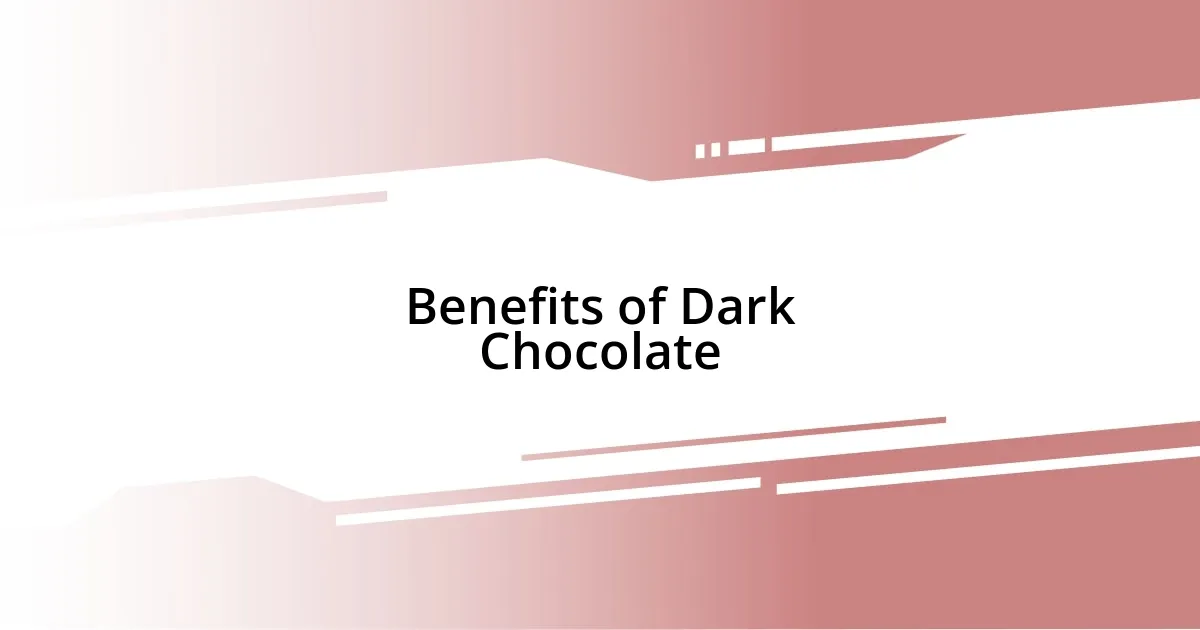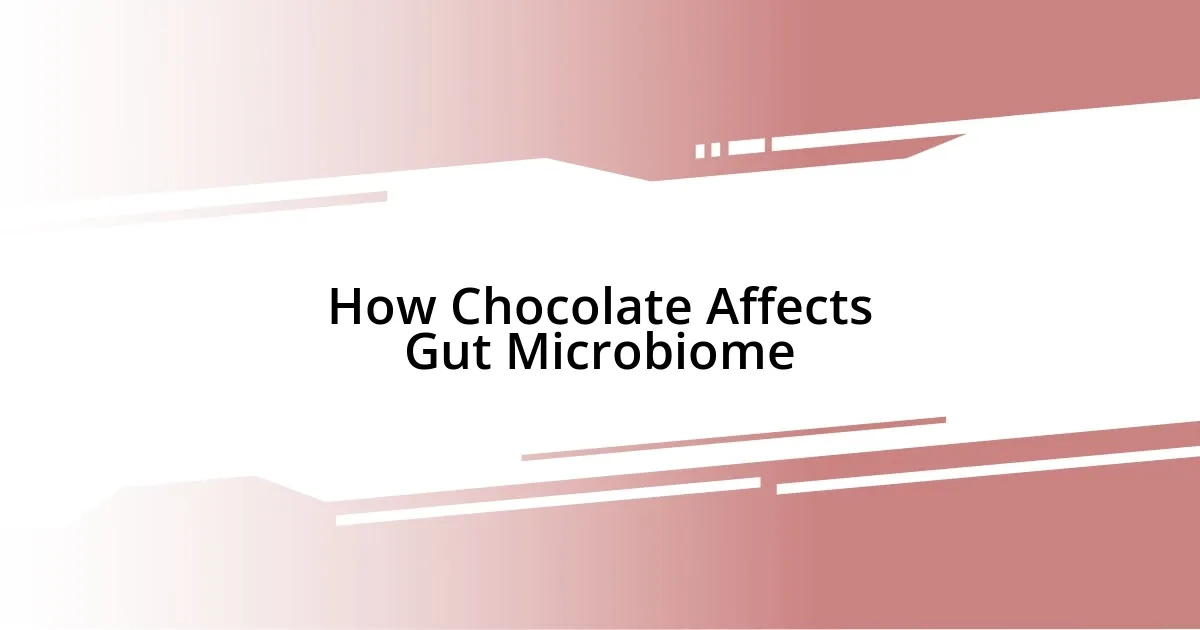Key takeaways:
- Dark chocolate is rich in polyphenols and flavonoids, promoting gut health, supporting beneficial bacteria, and improving cardiovascular health.
- Incorporating chocolate into your diet can enhance mood, cognitive function, and skin health, making it a delightful and healthful indulgence.
- Choosing high-cocoa dark chocolate with low sugar content is essential for maximizing health benefits while minimizing potential digestive discomfort.
- Moderation is key, as excessive chocolate consumption can lead to digestive issues and a sugar crash; be mindful of caffeine content as well.

Understanding Chocolate and Gut Health
Chocolate has long been a beloved treat, but its relationship with gut health may surprise you. I remember the first time I learned about the potential benefits of dark chocolate; it felt like I was finding a secret ally in my quest for wellness. Packed with polyphenols—compounds that have antioxidant properties—dark chocolate can actually promote a healthy gut microbiome.
When I first tried to incorporate dark chocolate into my diet, I wondered if it could really make a difference. As it turns out, research suggests that these polyphenols can nourish beneficial gut bacteria, leading to improved digestive health. It’s fascinating how something so delicious can also play a role in our body’s ecosystem—makes you think about your next chocolate choice, doesn’t it?
Moreover, the fermentation of chocolate, which occurs during its processing, creates compounds that can enhance gut flora diversity. I recall a time when I swapped my usual snack for a couple of squares of high-cocoa chocolate. Not only did I enjoy the indulgence, but I felt more energized afterward. It’s these little changes that remind me how unique our relationship with food can be, intertwining enjoyment and health seamlessly.

Benefits of Dark Chocolate
Dark chocolate is not just a satisfying treat; it also offers remarkable health benefits that can enhance our well-being. When I first learned about the power of flavonoids found in dark chocolate, I was intrigued. These compounds are known to improve blood flow and lower blood pressure, contributing to overall cardiovascular health. It’s amazing how a little indulgence can have such a profound impact on our body.
Here’s a quick rundown of the benefits I discovered about dark chocolate:
- Rich in Flavonoids: These antioxidants help reduce inflammation and improve heart health.
- Supports Gut Health: Nourishes beneficial gut bacteria, promoting a balanced microbiome.
- Enhances Mood: The pleasure of chocolate can elevate serotonin levels, boosting your mood and emotional well-being.
- Improves Cognitive Function: Dark chocolate supports brain health, potentially improving memory and focus.
- Promotes Skin Health: The antioxidants can protect against sun damage and improve skin hydration.
I vividly remember a day when I opted for a rich piece of dark chocolate instead of my usual sugary snack. Not only did it satisfy my sweet tooth, but it also left me with a warm, cozy feeling inside—like I was doing something good for my body while indulging at the same time. It’s moments like these that remind me of the simple pleasures that nurture my body and spirit simultaneously.

How Chocolate Affects Gut Microbiome
Chocolate has a unique way of influencing our gut microbiome. I remember experimenting with different types of chocolate, especially dark chocolate, and noticing a subtle shift in how my digestive system felt—lighter and more balanced. This isn’t just my imagination; studies suggest that the polyphenols in chocolate help beneficial bacteria like Bifidobacteria and Lactobacilli thrive, which can contribute to a healthier gut environment.
What truly amazes me is the impact of fermentation and processing on chocolate. The transformation from bean to bar is fascinating, as it actually enhances the compounds that our gut flora love. I once attended a chocolate tasting event and learned that well-processed chocolate contains prebiotic effects, which are crucial for growing our good gut bacteria. Who knew that enjoying a sweet treat could lead to such intriguing health benefits?
Additionally, there’s the complexity of chocolate that makes it so appealing. I recall savoring a dark chocolate truffle while relaxing after a long day. The rich texture and flavor were heavenly, but knowing it was feeding my gut flora made it feel even more rewarding. It’s great to consider that indulging in chocolate can be a nourishing act for our bodies, reinforcing the idea that food can be both pleasure and health enhancer.
| Chocolate Type | Effect on Gut Microbiome |
|---|---|
| Dark Chocolate | Promotes growth of beneficial bacteria and improves gut balance. |
| Milk Chocolate | Usually contains more sugar, which can negatively impact gut health. |
| White Chocolate | Lacks cocoa solids; minimal effect on gut microbiome. |

Chocolate Compounds and Digestive Health
Chocolate is fascinating not just for its taste, but also for its components that can aid digestion. I’ve found that the fiber content in dark chocolate can make a difference too. It’s not just a treat; it can help keep things moving along in a healthy way, which is something many of us can appreciate.
When I first discovered that chocolate contains prebiotics, I was genuinely surprised. It was like uncovering a hidden gem in my favorite indulgence! These prebiotics help nurture the friendly bacteria in our gut. Imagine enjoying a piece of dark chocolate while knowing it’s working behind the scenes to support your digestive health. Isn’t that a delightful thought?
There’s something comforting about recognizing that the cocoa flavonoids in chocolate can also help reduce gut inflammation. I recall feeling a sense of relief when I learned that treating myself to a rich, dark chocolate dessert could be a gentle way to support my digestive system. Who knew that my sweet cravings could come with such a health bonus? The idea that a small pleasure can actively contribute to my well-being adds a new layer of appreciation for chocolate.

Choosing the Right Chocolate
When it comes to choosing the right chocolate, I always lean towards dark chocolate with a high cocoa percentage—ideally 70% or higher. The first time I savored a bar with 85% cocoa, I was taken aback by its intense flavor, but I quickly realized that this richness packed more of those gut-friendly polyphenols. Have you ever tried a more bitter chocolate and found yourself loving the depth of its taste? It’s like unlocking a new level of enjoyment while doing something good for your gut!
I’ve learned that not all chocolate is created equal, especially when considering sugar content. I made the mistake once of indulging in a popular milk chocolate brand, believing it was just a harmless treat. Afterward, I felt sluggish and, to be honest, a bit bloated. That experience taught me to read labels carefully. Choosing chocolate with little to no added sugar not only satisfies my cravings but also supports my gut health—it’s a win-win!
Another important factor is the sourcing of chocolate. I remember discovering a local artisanal chocolatier who focused on ethically sourced cocoa. Not only did their chocolates elevate my taste experience, but knowing that the ingredients were responsibly harvested added a layer of satisfaction to every bite. Have you ever experienced that joy of finding a chocolate that feels good not only on your palate but also in your conscience? It truly enhances the enjoyment and makes every square a cherished moment.

Incorporating Chocolate into Diet
When I set out to incorporate chocolate into my diet, I found that starting with small, intentional choices made all the difference. For instance, I began adding a sprinkle of cocoa powder to my morning smoothie. The first time I tasted that rich and creamy blend, I couldn’t help but smile at how something so simple could elevate my breakfast while giving me a dose of antioxidants. Have you ever had a moment where you realized your health choices didn’t need to feel like a chore?
I also experimented with chocolate snacks throughout the day. One day, I swapped out my usual afternoon cookie for a couple of squares of dark chocolate. The burst of flavor and the satisfying melt in my mouth was incredibly rewarding. It was a game-changer—my energy spiked without the crash that often followed sugary treats. It made me wonder, why don’t more people realize how easy it can be to make healthier delicious swaps like this?
Incorporating chocolate into a relaxed evening routine became another delightful habit for me. After dinner, I started to savor a small piece of dark chocolate while I unwound with a book. This simple ritual transformed my nights, allowing me to indulge in gratitude for the simple pleasures of life. Have you ever noticed how a mindful treat can feel like a hug for your soul? It’s beautiful how chocolate can elevate not just your palate, but your entire mood.

Potential Risks of Chocolate Consumption
It’s essential to consider the potential risks that come with chocolate consumption. For instance, I found that even a small indulgence in chocolate could lead to digestive discomfort if I overindulged. During one chocolate-filled weekend, I learned the hard way that too much, even of my favorite treats, could upset my stomach. Do you ever push the limits with snacks, then regret it later?
Another factor to be mindful of is the caffeine content, particularly in dark chocolate. I once enjoyed a late evening treat without thinking twice, only to find myself tossing and turning all night. The buzz from the caffeine was unexpected and unpleasant. Have you ever had an experience where what you thought would be a relaxing treat turned into a restless night?
Additionally, the sugar content in many chocolates is a significant concern. I recall an afternoon where I indulged in a chocolate bar that seemed harmless, but the aftermath was far from pleasant. I experienced a sugar crash that left me feeling drained and moody. It made me reflect on how crucial it is to check the labels, as I want to enjoy chocolate but not at the cost of my overall well-being.












